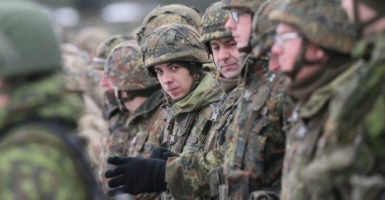Germany is upping its contribution to the North Atlantic Treaty Organization in the Baltic state of Lithuania. This is a welcome development.
The initial news came in October when Germany announced its commitment of Bundeswehr forces to Lithuania in 2017 as part of a NATO deterrence mission.
Materially, the German deployment will be substantial. Of the 1,000 NATO soldiers that are to be posted in Lithuania, almost 700 will be provided by Germany. Heavy weapons such as the Leopard 2 main battle tank are also to be a part of the contingent.
Germany’s contribution is particularly welcome since it tends to get lumped into a group of NATO countries that could probably contribute more, but often fail to do so. The timing is also opportune, considering President-elect Donald Trump has stressed that NATO’s European members need to do more.
Furthermore, Germany is often criticized as sympathizing with Russia in order to safeguard deep economic interests with Moscow. The Bundeswehr deployment signals that Germany prioritizes European security and its relationship with the U.S.
There is a positive history of recent U.S.-German military cooperation that should be acknowledged but not overstated. Germany is also home to numerous U.S. military installations.
Through NATO, Germany has stepped up to the plate in Afghanistan. At one time, Germany was the third-largest troop contributing nation to the NATO-led mission in Afghanistan. However, German soldiers were largely confined to the peaceful northern part of the country and were heavily restricted by operational caveats.
Yet one should not conclude from this deployment that Germany will always follow the U.S. policy line. Disagreement abounds between the U.S. and Germany on issues ranging from Ukraine, the eurozone debt crisis, the desirability of a European Union army, and the details of a potential transatlantic trade agreement.
Nor can Berlin guarantee acquiescence to U.S. policy. For example, Italy’s new prime minister, Paolo Gentiloni, recently resisted attempts to extend European Union sanctions on Russia by a year in addition to broadening the sanctions to cover Russia’s actions in Syria.
The Trump administration needs to appreciate Germany’s delicate relationship with the rest of Europe. During the periodic episodes of the eurozone debt crisis, depictions of Angela Merkel as a Nazi or of panzers rolling through southern European countries were commonplace.
Caricatures like these, while ridiculous, unfair, and unworthy of serious consideration, reflect lingering European suspicions that Germany harbors ambitions of geopolitical hegemony.
Acting through multilateral organizations like NATO allows Germany to positively contribute to European security and governance without engendering fear from its neighbors.
Ultimately, the Trump administration will have to deal with the Germany it has, not the one it wants. Berlin will probably never be willing to partake in every military operation that the U.S. undertakes. Berlin will probably insist that any NATO operation abide by the dictates and fine minutiae of international law. Berlin will probably place as much emphasis on dialogue with unsavory regimes as it ever will on military strength.
But when push comes to shove, Berlin will hopefully be there for Washington when it needs a partner that will do what it can to safeguard a peaceful and prosperous Europe, just as it is doing now in Lithuania.
































